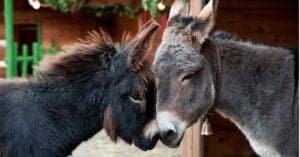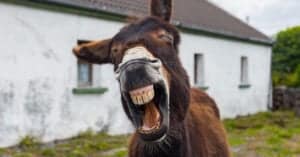The farm lifestyle is becoming increasingly popular. Some people want to start homesteading with a garden in the backyard. Others are becoming interested in beekeeping or having chickens for fresh eggs. Then, some people are interested in purchasing various farm animals, including donkeys. Whether you want a donkey to help with yard work, as emotional support, or just as an adorable pet, more and more people are jumping on the bandwagon. However, while it may be fun to daydream about owning this furry four-legged friend, what does it take to own a donkey? This article will cover donkey prices, from purchase price to monthly upkeep. We will also cover topics from what supplies you need, food, vet maintenance, and more. Let’s learn all about what it takes to own a donkey!
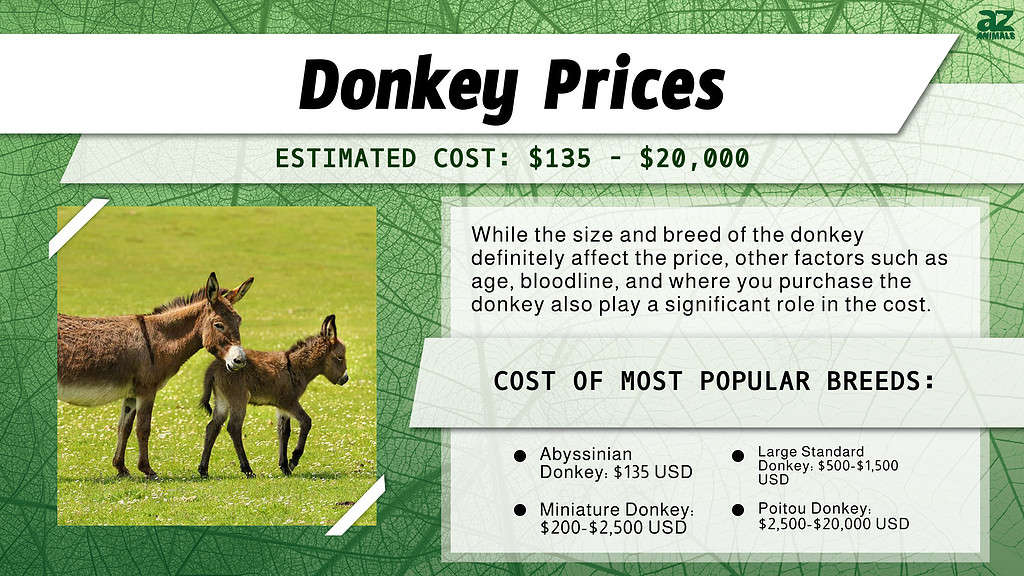
What Is a Donkey, Anyway?
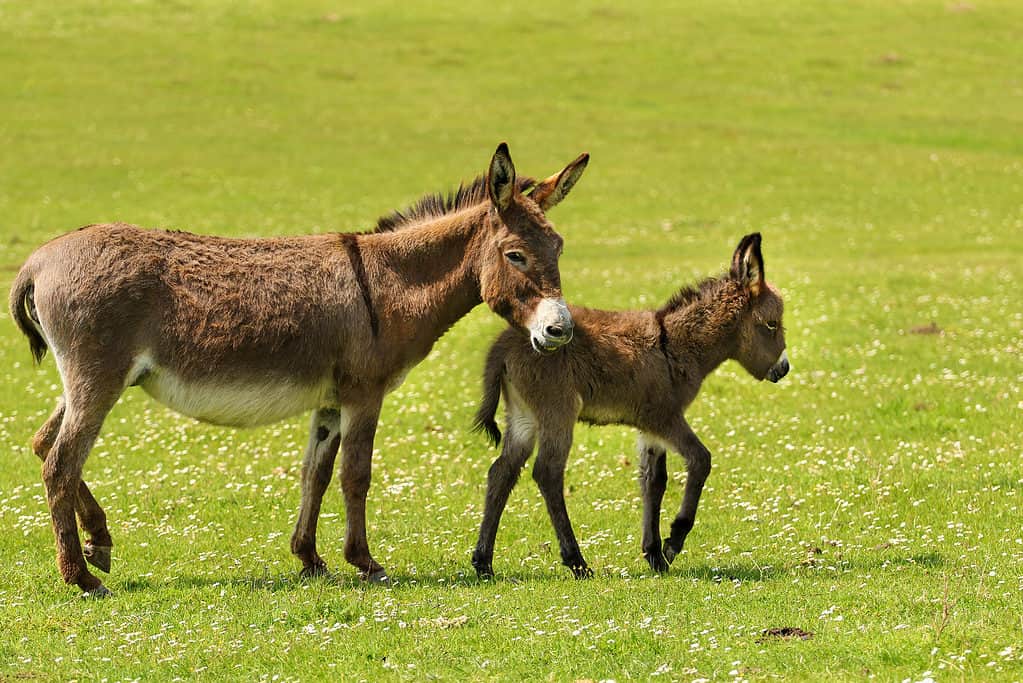
Donkeys were first domesticated 5,000 years ago.
©Geza Farkas/Shutterstock.com
A donkey (Equus asinus) is a mammal from the horse family. Although the donkey belongs to the horse family, it is an entirely different species. Donkeys were first domesticated 5,000 years ago and were originally used for milk and meat. Today, donkeys are mainly used for working. While they may be slower than a horse, they are more surefooted and stronger than horses of the same size. While many people joke about the donkey being a stubborn animal, donkeys are intelligent animals known for forming close relationships with humans. There are many different types of donkeys, ranging in size and color. Domesticated donkeys can be found worldwide, but they are best adapted for warm and dry areas. Now that you know what a donkey is let’s find out about the cost of owning a donkey and donkey prices.
Purchase Price
The initial purchase price of a donkey varies depending on many factors. Some factors that influence the purchase price of the donkey are breed, age, and adoption method, i.e., from a breeder or adopting from a rescue organization. The price will differ depending on what type of donkey you want or what is perfect for your family and situation. Let’s go over the different possibilities of donkey prices below.
Donkey Prices by Breed
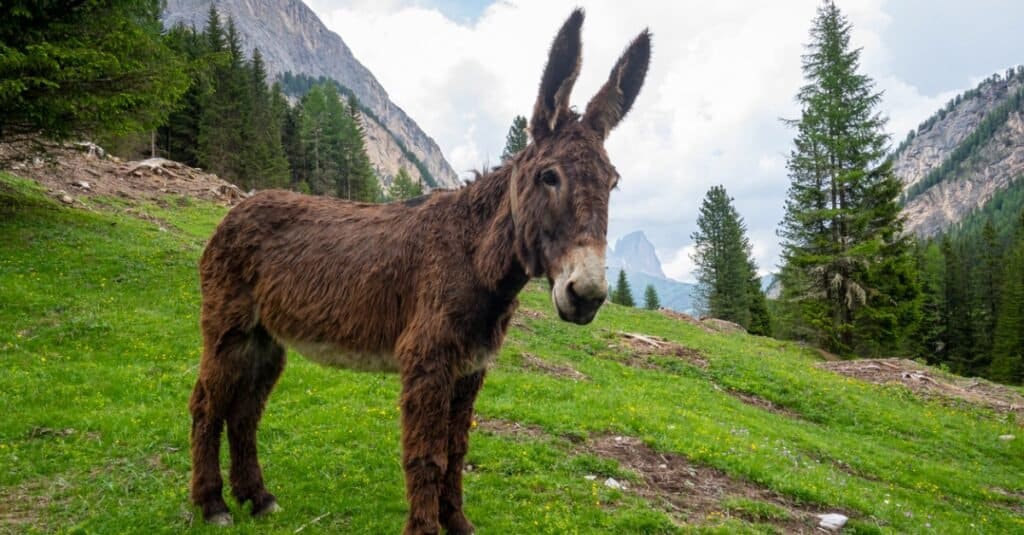
One of the main factors that determine donkey prices is the breed of the donkey being sold.
©iStock.com/Jacek Jacobi
Below is some basic information about each donkey breed and the average prices that they usually sell for. Please keep in mind that other factors can determine the pricing, such as the donkey’s age, health, and or the seller’s preference. Also, keep in mind that not all breeds are available for purchase in the United States.
Abyssinian Donkey
Estimated Average Price Per Donkey: $135 USD
This breed of donkey is commonly found throughout Ethiopia. Their coloring is usually slate-gray or chestnut-brown, and they usually weigh between 190-400 pounds. They are mainly used for transportation and farming and require a low care level. These curious creatures have a 30-40-year lifespan and can run up to 43 miles per hour.
Anatolia Donkey
Estimated Average Price Per Donkey: N/A
The Anatolia donkey is commonly found throughout Turkey. These donkeys are usually black or gray and are commonly used to transport goods. These mules are also used to help with farming operations. These donkeys are mostly found in Turkey and have been transported to other areas, such as Iraq and Iran. This donkey is not typically found in the United States and not likely one you would purchase as a pet.
Large Standard Donkey
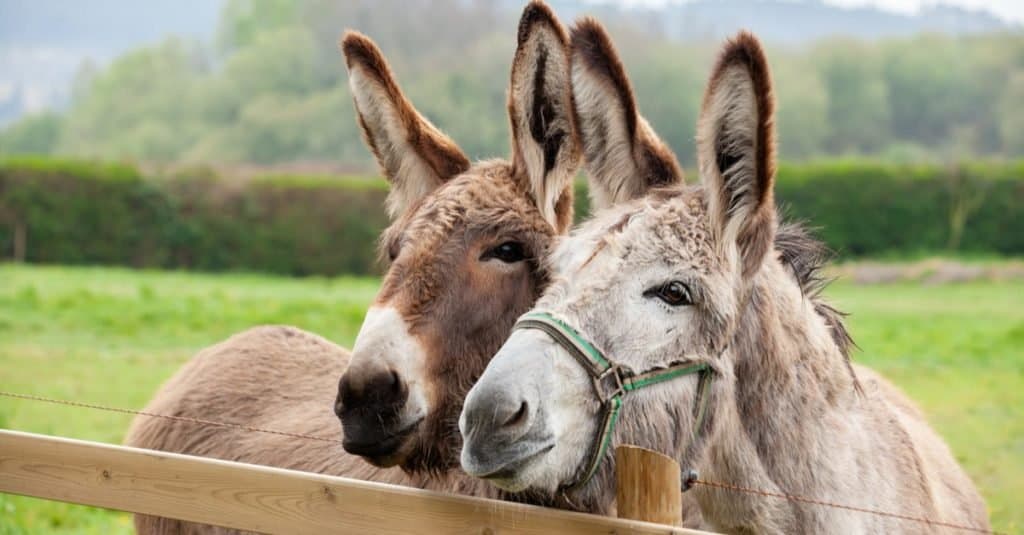
The large standard donkey is commonly used as a therapy animal because of their gentle nature.
©vvvita/Shutterstock.com
Estimated Average Price Per Donkey: $500-$1,500 USD
The large standard donkey is, just as its name suggests, large. This donkey stands between 4 -4.5 feet tall. As one of the tallest donkey breeds, this donkey weighs 800-1,200 pounds. Due to its larger size and strength, this breed is often used for plowing fields and carrying heavy loads. However, despite their massive size, these animals have a very gentle nature. This breed is also commonly used as therapy animals. Additionally, this donkey breed comes in various colors ranging from gray to black or brown.
American Mammoth JackStock Donkey
Estimated Average Price Per Donkey: $800-$1,500
The American Mammoth Jackstock is one of the breeds of the North American donkey. This particular breed was cross-bred repeatedly to create the desirable traits that are now present in the modern-day breed. This donkey has a distinct fur color, a dark brown on the body with a white muzzle and underbelly. Even more massive than the large standard donkey, the American Mammoth Jackstock is usually over 4.5 feet tall and weighs between 900-1,200 pounds. The main purposes of this mule are to produce draft mules or for agricultural work. This type of donkey is relatively rare, so males are usually kept for breeding purposes. These donkeys have a gentle temperament and a strong work ethic.
Mary Donkey
Estimated Average Price Per Donkey: N/A
Another breed of larger donkey is the Mary donkey. Reaching between 4.2 and 4.6 feet tall, these donkeys are not minis. In areas where this donkey was bred, it was determined that the pack mule should not be very large so that he could move efficiently and keep his balance along dangerous mountain trails. These donkeys are not likely to be found in the United States as they inhabit a limited area, and their populations are diminishing.
Miniature Donkey
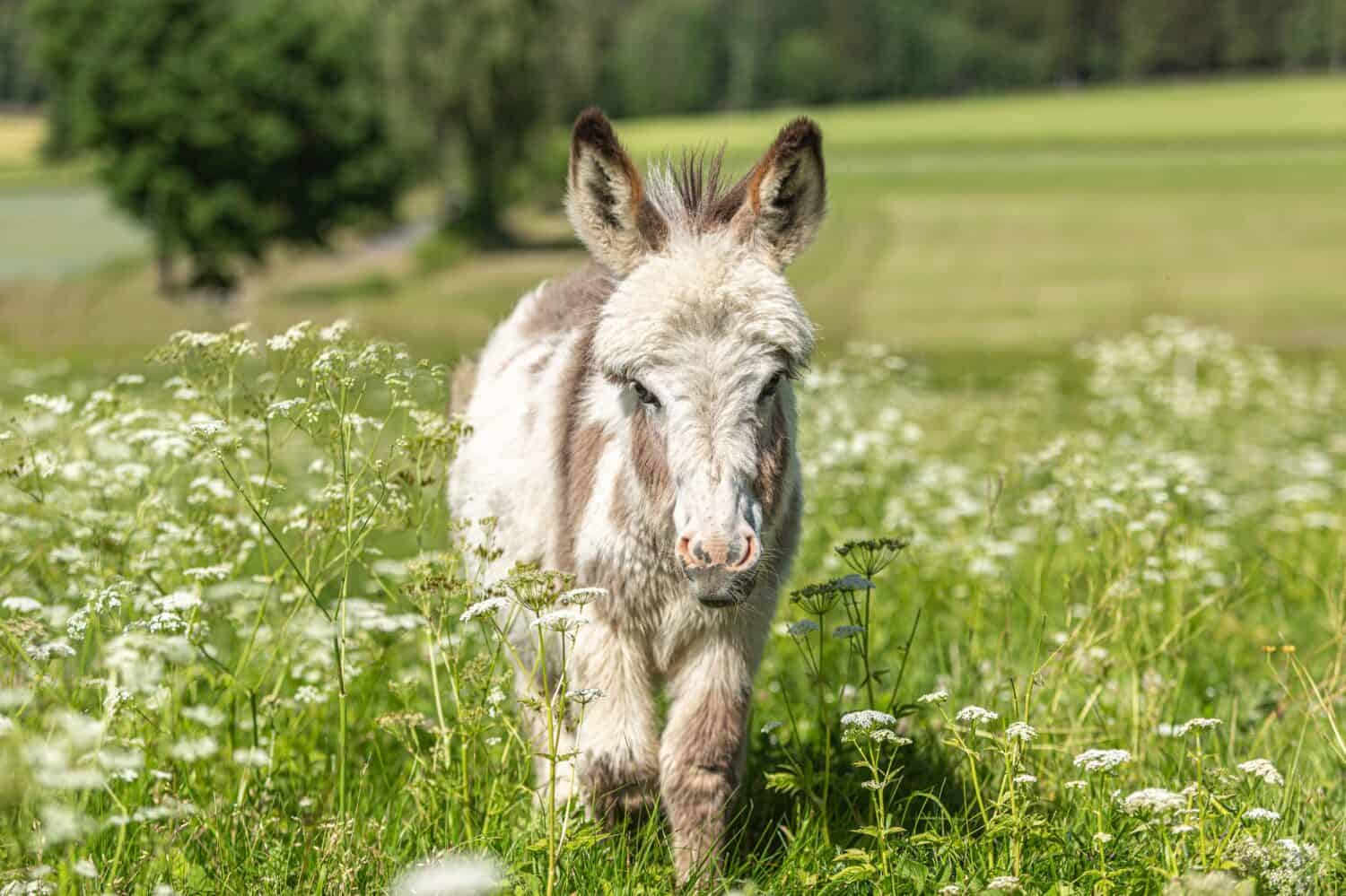
For minis, the size and coloring greatly affect the donkey’s pricing.
©Annabell Gsoedl/Shutterstock.com
Estimated Average Price Per Donkey: $200-$2,500
Perhaps one of the most sought-after donkey breeds is the miniature donkey. This donkey breed is native to the Mediterranean and has been bred with animals in the United States to produce a particular American breed of miniature donkey. People know this breed as the Miniature Mediterranean Donkey. While they are on the verge of extinction in the wild, American breeders are keeping their populations here alive. There are roughly 10,000 of this breed of donkey in the United States, but this only accounts for registered donkeys.
Unlike other donkeys that people know for their large size, this donkey is prized for its small size. A miniature donkey cannot stand more than 3 feet tall. This breed of donkey is one of the friendliest and most affectionate donkey breeds and makes a wonderful companion for their owners. They are also highly intelligent, easily trained, and docile. For this type of donkey, the size and coloring greatly affect its price.
Poitou Donkey
Estimated Average Price Per Donkey: $2,500- $20,000
While we do not entirely know the origins of this donkey, it is thought to have been bred in France. People breed this donkey solely for the purpose of producing mules of exceptional quality. While their size is similar to a regular donkey’s, their appearance is not. This donkey has hair that is half a foot long, completely covering their body. People say this mule is one of the best working mules, and because of that — and their unique appearance — these donkeys usually have a heftier price tag attached to them.
Standard Donkey
Estimated Average Price Per Donkey: $300-$2,000
The standard donkey is similar to the large standard donkey, except it is smaller. While the large standard donkey reaches 4.6 feet in height, the standard donkey only reaches 4 feet. In the United States, people group donkeys by size rather than breed, so they separate standard and large standard donkeys. Most people use these donkeys as companion animals or to produce mules.
Additional Factors Influencing Purchase Price
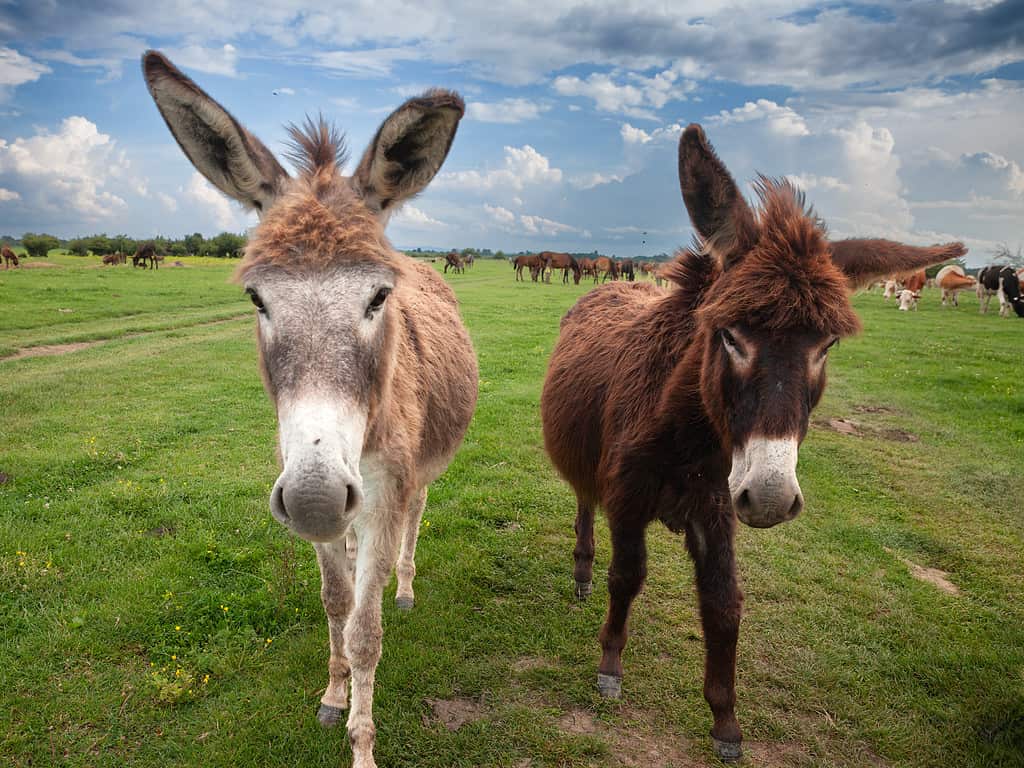
Some factors that affect donkey prices are breed, age, health, and seller preference.
©BalkansCat/iStock via Getty Images
While the size and breed of the donkey definitely affect the price — as you can see with the American Mammoth donkey vs. the standard donkey — there are other contributing factors that affect donkey prices. Below, we discuss a few of them.
Age and Bloodline
Age is another factor that contributes to the price difference between donkeys. You can get mature donkeys for a lot less than a younger donkey. Similarly, a younger, trained donkey would be more expensive than a younger, untrained one. Bloodline also affects price. If your selected donkey comes from a good bloodline, the cost of that donkey will be higher.
Seller
Where are you buying this donkey from? The answer to that question will directly correlate with the price you pay for your donkey. For example, in some cases, you can get a donkey for free. If it is from a friend or someone who loved their donkey but can no longer care for it, they may give it to a good home for free. If you adopt the donkey from a rescue organization, you should expect to pay a small fee. The rough estimate for adopting a donkey is between $70-$300 dollars. Remember, rescue organizations usually have neglected, abandoned, or abused donkeys. That means those animals may come with additional health concerns down the road, so while their purchase price may be more affordable, their upkeep could be more expensive.
If you purchase your donkey through a breeder, you will pay the highest price. Again, it depends on the breed and size of your donkey but also on your seller’s preferences and opinions of what they think their donkey is worth. For a breeder, be prepared to pay between $100 and $500, even more if it is a rare breed.
Cost of Upkeep
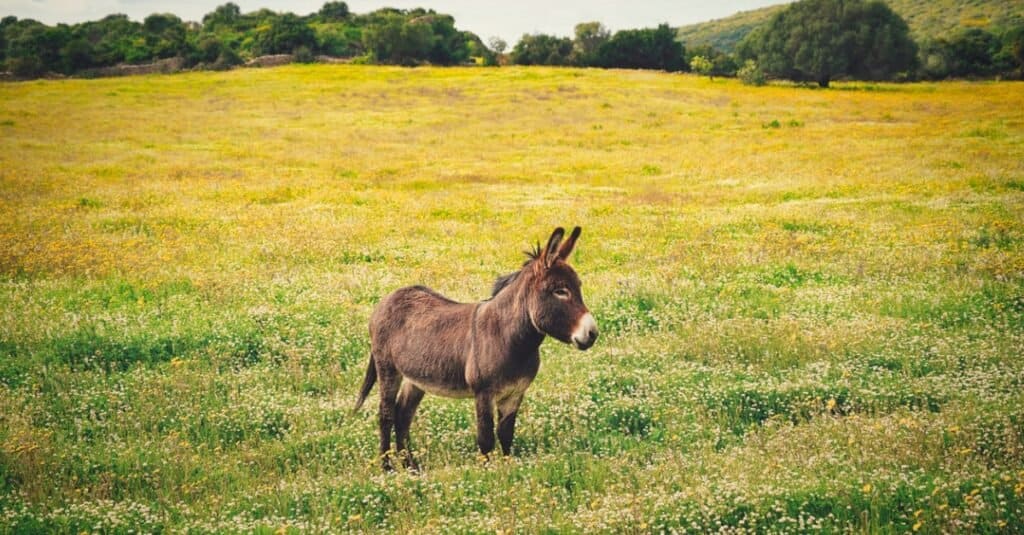
Buying a donkey is only a fraction of the cost; keeping that care and maintaining your donkey’s health is the true expense.
©iStock.com/lo-chef
Purchasing a donkey is the easiest and usually the most inexpensive part of owning a donkey. Purchasing cost is a one-time fee, and suddenly, BAM, you are a donkey owner. Now what? Now, you have to keep your new furry friend alive, well, and happy for the rest of his or her days, and that is where the dollar signs can begin to add up. With your donkey, you need to factor in costs for things like food, veterinary care, enclosures, entertainment for the donkey, and additional supplies.
Feeding Costs
Now that you own a donkey, you need to keep it fed. Donkeys are herbivores. Their diet mainly consists of pellets, straw, grass, and hay. They will also eat oats and shrubs. These hard-working animals also have a hard-working appetite! They can consume as much as 6,000 pounds of food each year. Hay bales can cost anywhere from $30 to $300 per ton of hay. A 50-pound bag of crimped oats costs about $50 dollars, and buckets of pellets can range from $85.00 to $200.00. So, it is safe to say you should reserve between $100 and $300 a month to feed your donkey.
Veterinary Care Costs
Vet bills are not cheap no matter what animal you are caring for, but for a donkey, it may cost a little extra because they are not your average house pet. Your donkey’s overall health will determine the cost of these veterinary visits. If your donkey is healthy, then they will only require routine checkups and preventative care such as vaccines. However, donkeys are susceptible to a lot of health issues, such as parasites and joint issues.
If you do not maintain your donkey’s health and it starts to fail, it may come down with one or more health issues, and the cost of fixing those issues can be much more expensive. For a healthy donkey, you can budget about $50 a month for vet care. However, if your donkey is older or has compromised health, you will need to budget more; the exact amount depends on your donkey’s health and current issues.
Land and Shelter Costs
While donkeys are well adapted to survive in harsher climates, they still have some basic needs. First, you need to make sure you have the space for the donkey. You should have a minimum of 0.5 an acre per donkey. Although they like all that open land, they do also need a place to sleep and seek shelter. For an average-sized donkey, you want their shelter to be about 50 square feet of covered area. Additionally, you want to make sure that they have proper bedding. Straw, particularly barley straw, makes great bedding for donkeys.
The cost of the land depends on how many acres you purchase and which state you are living in. The shelter price depends on whether you build it yourself vs. having someone build it for you. The bedding can be the same hay you use to feed your donkey. If the environment you live in is cold, you will also need to purchase blankets and coats for those colder seasons; those average around $50 dollars.
Enclosure and Entertainment Costs
Also, if your space doesn’t already have a fence, you will need to install one to keep the donkeys in their designated area. When building a fence, make sure to use materials that the donkeys cannot easily knock down or jump over. On average, donkeys can jump about six feet, so keep that in mind when constructing your fences.
Finally, donkeys are social creatures and enjoy the company of others. If you are going to get one donkey, it is best to get two. However, two donkeys mean it will be double the cost because you need double the space, double the food, double the grooming, and double the shelter size. However, keeping your furry friend happy and healthy is worth it and may save you issues down the line.
Additional Supplies and Costs
For grooming your donkey, you will need to purchase a hoof pick and a brush. Neither of those items is too expensive, and you purchase them once and can continue to use them to maintain your donkey’s health. If you decide to get your donkey professionally groomed, you will have an additional cost.
Additionally, if you opt for pet insurance, you will have an additional monthly cost. The exact cost of the insurance will depend on which company you select and what type of coverage you want to include in your plan. Donkey owners usually find pet insurance to be a good idea, as it not only helps lower vet bills but also covers damage or injuries that may occur if your donkey gets lost or stolen.
Other supplies you may need to look into and have for owning a donkey include a lead rope, halter, and a brush.
Recap of Estimated Cost of Purchasing and Upkeeping a Donkey
Estimated Cost of Purchasing a Donkey
Here is a table that summarizes the purchase price of a donkey based on breed. You should remember that the donkey’s age, lineage, health condition, seller, and adoption route also affect the pricing of your chosen donkey.
| Donkey Breed | Average Cost |
|---|---|
| Abyssinian Donkey | $135 USD |
| Anatolia Donkey | N/A |
| Large Standard Donkey | $500-$1,500 USD |
| American Mammoth JackStock Donkey | $800-$1,500 USD |
| Mary Donkey | N/A |
| Miniature Donkey | $200-$2,500 USD |
| Poitou Donkey | $2,500-$20,000 USD |
| Standard Donkey | $300-$2,000 USD |
Estimated Cost of Upkeeping a Donkey
Remember, buying the donkey is the easy part! What does it cost to keep a donkey in 2023? While the donkey may not be as expensive as some other farm animals, let’s say it isn’t the cheapest thing in the world. Below, you can find a table that summarizes the average costs for the upkeep of a donkey in 2023. Please keep in mind these figures are rough estimates, and each person’s cost would be specific to them and their donkey’s particular needs.
| Additional Cost Factor | Description | Average Monthly Cost |
|---|---|---|
| Age and Bloodline | Older donkeys are cheaper than younger donkeys, and good bloodlines increase the selling price. | Dependent upon the donkey. |
| Seller | Where you purchase the donkey from affects the price of that donkey. | Free-$500 or more. |
| Feeding Costs | Donkeys eat a variety of hay, oats, grasses, shrubs, pellets, and straw. | Reserve between $100-$300 a month. |
| Veterinary Care | Your donkey’s health status affects the cost of your vet bills. | Dependent upon the donkey. |
| Land and Shelter | You will need 0.5 per donkey, and they need a 50-square-foot enclosed shelter space. | The land price depends on how much you buy and where you live. Shelter prices vary as well. |
| Enclosures and Entertainment | Donkeys need to be in an enclosed space, and they need friends. | The price depends on the type of fencing you choose, how big the area being fenced is, and how many donkeys you plan to buy. |
| Additional Supplies | Additional supplies include a lead rope, halter, brush, and hoove cleaning picks. You should also get pet insurance. | Pet insurance prices vary by coverage plan. The additional tools could be bought for between $50-$150 USD. |
The photo featured at the top of this post is © DragoNika/Shutterstock.com
Thank you for reading! Have some feedback for us? Contact the AZ Animals editorial team.




